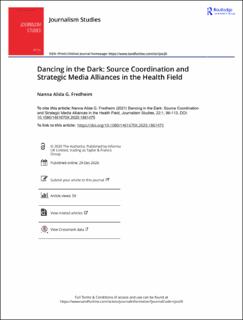Dancing in the Dark: Source Coordination and Strategic Media Alliances in the Health Field
| dc.contributor.author | Fredheim, Nanna Alida | |
| dc.date.accessioned | 2021-01-08T07:30:07Z | |
| dc.date.available | 2021-01-08T07:30:07Z | |
| dc.date.created | 2020-12-29T18:26:49Z | |
| dc.date.issued | 2020 | |
| dc.identifier.issn | 1461-670X | |
| dc.identifier.uri | https://hdl.handle.net/11250/2722108 | |
| dc.description.abstract | The news media are important for political influence, and interest groups compete for visibility. However, actors on the same policy field also tend to have close ties and cooperate when interests overlap. Existing research on sources has overwhelmingly focused on journalist-source relations, and far less on how news content is negotiated between the sources themselves. Based on triangulation of in-depth interviews with 40 representatives from Norwegian health interest groups, representing business, citizens and medical professionals, the present article unpacks how groups cooperate on media management behind, and in, the media limelight. Conceptualizing cooperation as resource exchange, the study explores the barriers and incentives that condition media cooperation and visibility, theorized as network dependencies. By exploring how interest groups reason and negotiate media cooperation and access, the study adds new insight to the field of news production, and contributes to the theorizing of source representation in the news. | |
| dc.language.iso | eng | |
| dc.title | Dancing in the Dark: Source Coordination and Strategic Media Alliances in the Health Field | |
| dc.type | Peer reviewed | |
| dc.type | Journal article | |
| dc.description.version | submittedVersion | |
| dc.description.version | submittedVersion | |
| dc.description.version | publishedVersion | |
| dc.source.journal | Journalism Studies | |
| dc.identifier.doi | 10.1080/1461670X.2020.1861475 | |
| dc.identifier.cristin | 1863978 | |
| dc.relation.project | Norges forskningsråd: 258993 | |
| cristin.ispublished | true | |
| cristin.fulltext | preprint | |
| cristin.fulltext | preprint | |
| cristin.fulltext | original | |
| cristin.qualitycode | 2 |
Tilhørende fil(er)
Denne innførselen finnes i følgende samling(er)
-
Publikasjoner fra CRIStin [709]
-
Tidsskriftpublikasjon [386]
Artikkel i tidsskrift
